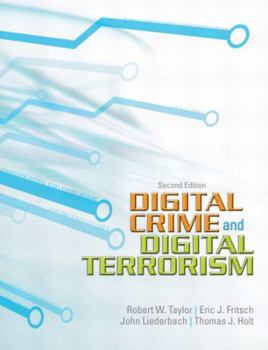Digital Crime and Digital Terrorism
Select Format
Select Condition 
Book Overview
For courses in computer crime.A complete, easy-to-understand introduction to computer crimeCyber Crime and Cyber Terrorism is a comprehensive introduction to the acts and theories of cyber crime,... This description may be from another edition of this product.
Format:Paperback
Language:English
ISBN:0137008775
ISBN13:9780137008773
Release Date:March 2010
Publisher:Pearson
Length:343 Pages
Weight:1.35 lbs.
Dimensions:0.8" x 7.0" x 9.1"
Customer Reviews
1 rating
Textbook of Magnitude that Tries to Deliver
Published by Thriftbooks.com User , 19 years ago
This book is far superior than many other books on similar topics, and the authors walk the line well between being academic and practical. The thrust of the book is toward an understanding of what criminologists call "emerging crime," and it delivers a well researched baseline of information synthesized with what is known or speculated about emerging trends. The end result is a product suitable for adoption in the academic marketplace, and would even make for fascinating reading by laypersons. Overall, the book is congruent with the scholarly and curricular purposes of higher education, and one shares the sense of urgency that comes across at times, but one also relishes the moments, evident in the writing, when careful and meticulous reflection is done. The introductory chapter spares the reader from a boring introduction to the history of the Internet, and the basic typology relied upon is the well-known computer as target and computer as tool (instrument) which comes from some of the earliest distinctions made, as well as the third type, the computer as incidental to crime. The authors wisely stick to a legalistic approach, and educate or orient the reader about theft and fraud law, which is important to do. Gladly, there is not any overemphasis upon news stories. The writing is generalized when it can be, and specific when it has to be. The criminological theory chapter is ripe with promise. Twenty-five pages are spent bringing the reader up to par on the mainstream theories in criminology, but then, strain, learning, and control theories are just applied, not really extended, to explain computer crime. Theoretical extensions are left to the reader's imagination. There is a well-done analysis of hacker subcultures, but the approach taken is symbolic interactionist, leading to a morally relativistic position that hackers and computer criminals are qualitatively and quantitatively different from other criminals. Likewise with the discussion of virus writers, semantic danger is noted in perceiving virus writers as "technopathic" and I take this as the authors attempting to make the reader more culturally sensitive to the plight of those poor, unfairly-labeled "bad" guys. The crimes of embezzlement, economic espionage, money laundering, and fraud are discussed in a straightforward manner, but the approach is quite legalistic, and all the reader will walk away with is a better understanding of the CFA and EEA acts. A welcome focus on victimization appears when stalking and obscenity are discussed, but the writing is quite antiseptic, handling very meticulously and tactfully things like child prostitution and sexual predators on the Web. Topics like sex tourism are also discussed, but there's really no "voice" of the victims to be found. Towards the middle, the book shifts to what criminal justice agencies are doing, but the discussion is freshman-level, and there's really no coverage of the Patriot Act, Home






